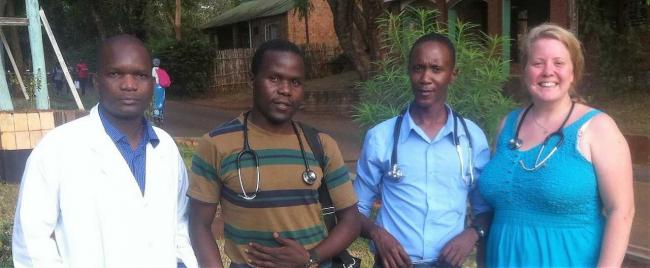Rotarians in Colchester are helping a hospital in Africa fight against “silent killer” diseases.

A grant of $47,000 has been given by the Rotary Club of Colchester (Essex, UK — D 1240) with the help of Colchester doctor Isobel King.
The money will be spent at the Mulanje Mission Hospital in Malawi.
The Rotary club became supporters of Dr King’s work after she applied for a grant to support her travel expenses.
There was also support from the estate of the late Nick Clough.
While working in Malawi, she wrote an eye-opening blog and the club wanted to offer more support.
The project is a collaboration between Mulanje Mission Hospital and the Rotary Clubs of Colchester, Limbe in Malawi, Bielefeld Sűd in Germany and Zwolle in the Netherlands.
It has also been supported by the Rotary District 1240 and the Rotary Foundation.
Dr King, a former student at Colchester County High School for Girls, said: “Malawi is one of the poorest countries in the world. Most people are farmers living on less than £1 per day, few finish school and challenges to daily life are many.
“Among those are terrible infectious diseases such as HIV and tuberculosis, which place a huge burden on families and their communities.
“However, what is less well recognised is the burden of diseases which aren’t infectious, diseases we don’t normally associate with Africa.
“Diabetes, uncontrolled high blood pressure, asthma, epilepsy, cancer and mental health problems are prevalent but untreated in many rural Malawian communities.”
If these diseases go untreated, they result in life-long disability and early death, due to organ failure, blindness and physical impairment.
Dr King added: “In a poor country like Malawi, there is little capacity to support people when these problems occur, with no community nursing, social work or physiotherapy.
“The economic and practical burden falls solely on families.”
She led a clinic with Malawian colleagues for patients with diabetes, high blood pressure or asthma.
During her 20 months in Malawi, the clinic quadrupled in size but less than 2 per cent of people needing treatment are receiving it.
The project will have several phases.
The current hospital-based clinic will be renovated to allow more patients to be seen in a private setting, and they will learn how they can help themselves through diet and exercise.
Staff will also receive training as these diseases are relatively unknown to them and staff need more experience.
The latter phase will see the development of rural clinics.
Source: Gazette Standard





